|
Books Should Be Free Loyal Books Free Public Domain Audiobooks & eBook Downloads |
|
|
Books Should Be Free Loyal Books Free Public Domain Audiobooks & eBook Downloads |
|
Essay/Short Nonfiction |
|---|
|
Book type:
Sort by:
View by:
|
By: Joseph Trienens (b. 1863) | |
|---|---|
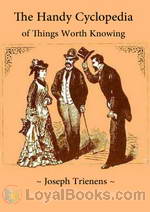 The Handy Cyclopedia of Things Worth Knowing
The Handy Cyclopedia of Things Worth Knowing
Written in 1910, this “cyclopedia” is full of information that was quite useful at the time. A hundred years later, its text is more humorous than practical — although some advice never goes out of style. | |
By: Karl Marx (1818-1883) | |
|---|---|
 Selected Essays
Selected Essays
| |
 Revolution and Counter-Revolution, or: Germany in 1848
Revolution and Counter-Revolution, or: Germany in 1848
Revolution and Counter-Revolution is an account of what happened in Prussia, Austria and other German states during 1848, describing the impact on both middle-class and working-class aspirations and on the idea of German unification. Events in Austria and Prussia are discussed, along with the role of the Poles and Czechs and Panslavism, which Engels was against. | |
By: Kate M. Foley | |
|---|---|
 Five Lectures on Blindness
Five Lectures on Blindness
The [five] lectures were written primarily to be delivered at the summer sessions of the University of California, at Berkeley and at Los Angeles, in the summer of 1918. . . they are the outgrowth of almost a quarter of a century spent in work for the blind, and were written from the standpoint of a blind person, seeking to better the condition of the blind. They were addressed not to the blind, but to the seeing public, for the benefit that will accrue to the blind from a better understanding of their problems. (Extract from the Forward by Milton J. Ferguson) | |
By: Kenneth Grahame (1859-1932) | |
|---|---|
 The Golden Age
The Golden Age
If you've loved and cherished The Wind in The Willows, you'll be delighted to read The Golden Age. In this book of reminiscences by Kenneth Grahame, the much loved creator of Winnie The Pooh, readers are granted an insight into the writer's childhood. The opening lines of the Prologue provide a poignant reminder of Grahame's childhood. When he was just five, his mother died in childbirth and his father who had a long standing problem with alcoholism consigned his four children, including the newborn baby, to the care of their grandmother in Berkshire... | |
By: L. (Lizzy) Lind-af-Hageby (1878-1963) | |
|---|---|
 Mountain Meditations and some subjects of the day and the war
Mountain Meditations and some subjects of the day and the war
| |
By: Lafcadio Hearn (1850-1904) | |
|---|---|
 In Ghostly Japan
In Ghostly Japan
This collection of 14 stories collected by Lafcadio Hearn, contains Japanese ghost stories, but also several non-fiction pieces. Hearn tries to give a glimpse into the customs of the Japanese, by giving examples of Buddhist Proverbs and explaining the use of incense and the nation wide fascination with poetry. Furthermore, he has again translated several hair-rising ghost stories, like "A Passional Karma" about the truly undying love of a young couple. | |
 Kokoro: Hints and Echoes of Japanese Inner Life
Kokoro: Hints and Echoes of Japanese Inner Life
In an introductory paragraph, Lafcadio Hearn declares his intention: "The papers composing this volume treat of the inner rather than of the outer life of Japan, for which reason they have been grouped under the title Kokoro (heart). Written with the above character, this word signifies also mind, in the emotional sense; spirit; courage; resolve; sentiment; affection; and inner meaning, just as we say in English, "the heart of things."" The result is a highly eclectic collection of stories, diary... | |
By: Leo Tolstoy (1828-1910) | |
|---|---|
 Tolstoy on Shakespeare
Tolstoy on Shakespeare
This book contains a critical essay on Shakespeare by Leo Tolstoy. It is followed by another essay named "Shakespeare's attitude to the working classes" by Ernest Crosby and extracts of a letter by George Bernard Shaw. | |
By: Linnean Society of London | |
|---|---|
 Journal of the Proceedings of the Linnean Society - Vol. 3 Zoology
Journal of the Proceedings of the Linnean Society - Vol. 3 Zoology
| |
By: Lloyd Eshbach (1910-2003) | |
|---|---|
 The Gray Plague
The Gray Plague
End of the world sci-fi tale borrows heavily from H.G. Wells' WOTW and In The Days of the Comet -- looks like fun ! | |
By: Lord Redesdale (1837-1916) | |
|---|---|
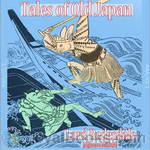 Tales of Old Japan
Tales of Old Japan
Tales of Old Japan by Lord Redesdale is a collection of short stories focusing on Japanese life of the Edo period (1603 - 1868). It contains a number of classic Japanese stories, fairy tales, and other folklore; as well as Japanese sermons and non-fiction pieces on special ceremonies in Japanese life, such as marriage and harakiri, as observed by Lord Redesdale. The best know story of these is "The Forty-seven Ronins" a true account of samurai revenge as it happened at the beginning of 18th century Japan... | |
By: Louis Becke (1855-1913) | |
|---|---|
 The Beginning Of The Sea Story Of Australia 1901
The Beginning Of The Sea Story Of Australia 1901
| |
 The South Seaman An Incident In The Sea Story Of Australia - 1901
The South Seaman An Incident In The Sea Story Of Australia - 1901
| |
 The Americans In The South Seas 1901
The Americans In The South Seas 1901
| |
By: Louise Imogen Guiney (1861-1920) | |
|---|---|
 Goose-Quill Papers
Goose-Quill Papers
Louise Imogen Guiney, and American poet and essayist, here presents twenty essays with her characteristic wit and poetic flair and often a touch of satire on sometimes common topics such as the apple, the moon, mathematics and the garret, even the provocative "On Teaching One's Grandmother how to Suck Eggs." - Summary by Larry Wilson | |
By: M. H. (Marion Harry) Spielmann (1858-1948) | |
|---|---|
 The History of "Punch"
The History of "Punch"
| |
By: Mabel E. Wotton (1863-1927) | |
|---|---|
 Word Portraits of Famous Writers
Word Portraits of Famous Writers
Mabel Elizabeth Wotton, an author herself, moved in the literary circles of the late nineteenth century establishing many close friendships, She presents for us here, not literary criticism nor biographical sketches, but "word portraits," shore vignettes of a persons physical appearance and elements of behavior or personality. These are all drawn from many sources -- biographies, newspapers, or personal friends of the authors. Some descriptions are based on paintings or drawings, but the majority are derived from personal acquaintance. Thus, we have a unique view of these famous artists that we seldom read. - Summary by Larry Wilson | |
By: Marcus Tullius Cicero | |
|---|---|
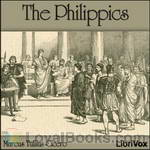 The Philippics
The Philippics
A philippic is a fiery, damning speech delivered to condemn a particular political actor. The term originates with Demosthenes, who delivered an attack on Philip II of Macedon in the 4th century BCE.Cicero consciously modeled his own attacks on Mark Antony, in 44 BC and 43 BC, on Demosthenes’s speeches, and if the correspondence between M. Brutus and Cicero are genuine [ad Brut. ii 3.4, ii 4.2], at least the fifth and seventh speeches were referred to as the Philippics in Cicero’s time. They were also called the Antonian Orations by Aulus Gellius... | |
By: Margaret Fuller (1810-1850) | |
|---|---|
 Woman in the Nineteenth Century and Kindred Papers Relating to the Sphere, Condition, and Duties of Women
Woman in the Nineteenth Century and Kindred Papers Relating to the Sphere, Condition, and Duties of Women
Margaret Fuller (1810-1850) was an American feminist, writer, and intellectual associated with the Transcendentalist movement. Her book Woman in the Nineteenth Century (1845) is considered the first major feminist work in the United States. Her life was short but full. She became the first editor of the transcendentalist journal The Dial in 1840, before joining the staff of the New York Tribune under Horace Greeley in 1844. By the time she was in her 30s, Fuller had earned a reputation as the best-read person in New England, male or female, and became the first woman allowed to use the library at Harvard College... | |
By: Marian Storm (1857-1926) | |
|---|---|
 Minstrel Weather
Minstrel Weather
A series of poetically written meditations on the seasons and other nature subjects. Or “ …Minstrel Weather, a series of open-air vignettes which circle the zodiac with the attentive eye of a naturalist and the enchanted ardor of a poet.” - Summary by Christopher Morley, Modern Essays, 1921, and David Wales | |
By: Mark Twain (1835-1910) | |
|---|---|
 Alonso Fitz and Other Stories
Alonso Fitz and Other Stories
A collection of Twain short stories including:The Loves Of Alonzo Fitz Clarence And Rosannah EtheltonOn The Decay Of The Art Of LyingAbout Magnanimous-Incident Literature The Grateful Poodle The Benevolent Author The Grateful HusbandPunch, Brothers, PunchThe Great Revolution In PitcairnThe Canvasser's TaleAn Encounter With An InterviewerParis NotesLegend Of Sagenfeld, In GermanySpeech On The BabiesSpeech On The WeatherConcerning The American LanguageRogers | |
 What is Man? and Other Essays
What is Man? and Other Essays
"What Is Man?", published by Mark Twain in 1906, is a dialogue between a young man and an older man jaded to the world. It involves ideas of destiny and free will, as well as of psychological egoism. The Old Man asserted that the human being is merely a machine, and nothing more. The Young Man objects, and asks him to go into particulars and furnish his reasons for his position. This collection of short stories covers a wide range of Twain's interests: the serious, the political and the ironically humorous. | |
 Fenimore Cooper's Literary Offences
Fenimore Cooper's Literary Offences
This is Mark Twain's vicious and amusing review of Fenimore Cooper's literary art. It is still read widely in academic circles. Twain's essay, Fenimore Cooper's Literary Offenses (often spelled "Offences") (1895), particularly criticized The Deerslayer and The Pathfinder. Twain wrote at the beginning of the essay: 'In one place in Deerslayer, and in the restricted space of two-thirds of a page, Cooper has scored 114 offenses against literary art out of a possible 115. It breaks the record.' Twain listed 19 rules 'governing literary art in domain of romantic fiction', 18 of which Cooper violates in The Deerslayer. (Introduction by Wikipedia and John Greenman) | |
 The Curious Republic of Gondour and Other Whimsical Sketches
The Curious Republic of Gondour and Other Whimsical Sketches
As the title reveals, these stories are a collection of some of Mark Twain's more fanciful and eccentric works. They run the gamut from political commentary to our species' need to "be remembered" somehow. Taken as a whole the stories are "whimsical". Taken individually, they speak the truth in different ways. (Introduction by John Greenman) | |
 In Defense of Harriet Shelley
In Defense of Harriet Shelley
Mark Twain pulls no punches while exposing the "real" Percy Shelley in this scathing condemnation of Edward Dowden's "Life of Shelley". Even though, as Twain writes, "Shelley's life has the one indelible blot upon it, but is otherwise worshipfully noble and beautiful", Twain shows how Shelley's extra-marital conduct might easily be seen to have been the cause of his wife Harriet's suicide. (Introduction by John Greenman) | |
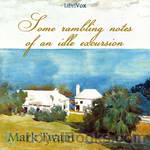 Some Rambling Notes of an Idle Excursion
Some Rambling Notes of an Idle Excursion
Written for the Atlantic magazine in 1877, this is a collection of stories about a trip Mark Twain made with some friends to Bermuda. It contains fascinating descriptions of Bermuda the island, and some of its people as well as an explanation of why Bermuda's houses are "so white". | |
 How to Tell a Story, and Other Essays
How to Tell a Story, and Other Essays
In his inimitable way, Mark Twain gives sound advice about how to tell a story, then lets us in on some curious incidents he experienced, and finishes with a trip that proves life-changing. | |
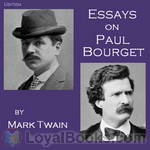 Essays on Paul Bourget
Essays on Paul Bourget
Collection of short essays concerning French novelist and critic Paul Bourget. Included: "What Paul Bourget Thinks of Us" and "A Little Note to M. Paul Bourget". | |
 Mark Twain's Speeches
Mark Twain's Speeches
Spanning the time between 1872 and the year before he died, this collection of after-dinner speeches, random thoughts to "the press", etc. clearly documents, once again, the truly eclectic mind of Samuel Clemens. It also demonstrates how he dealt with adulation, compliments and notoriety...head on! This collection is a treasure-trove of Twain sayings, witticisms and pronouncements on a huge galaxy of issues and concerns in his life. | |
 On the Decay of the Art of Lying
On the Decay of the Art of Lying
| |
 Christian Science
Christian Science
Christian Science is a 1907 collection of essays Mark Twain wrote about Christian Science, beginning with an article that was published in Cosmopolitan in 1899. Although Twain was interested in mental healing and the ideas behind Christian Science, he was hostile towards its founder, Mary Baker Eddy . He called her, according to American writer Caroline Fraser, "[g]rasping, sordid, penurious, famishing for everything she sees—money, power, glory—vain, untruthful, jealous, despotic, arrogant, insolent, pitiless where thinkers and hypnotists are concerned, illiterate, shallow, incapable of reasoning outside of commercial lines, immeasurably selfish... | |